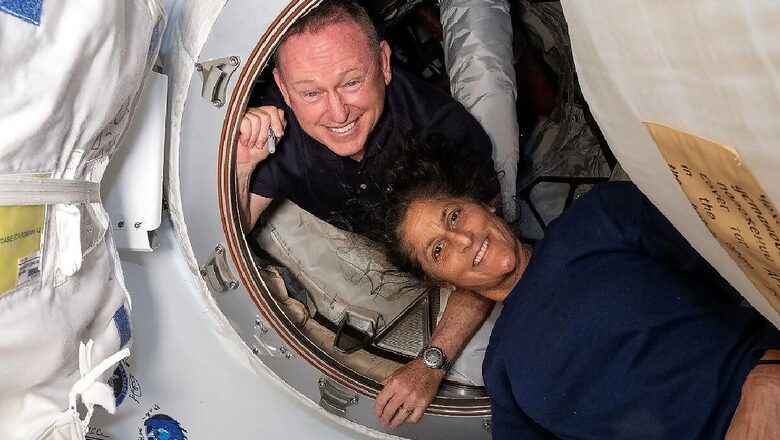
views
Space is not just a frontier to explore, it’s a mirror reflecting the strength and fragility of humans. It has always fascinated us with its vastness, beauty, and mysteries. Recently, the world has been captivated by the extended space mission of astronauts Sunita Williams and Barry Willmore. Their journey is not only advancing science but also testing the limits of what humans can endure. As an Air Force pilot with decades of flying and curiosity in space, I developed a deep understanding of how beyond gravity, environment and outer space affect the human body. Space is both awe-inspiring and challenging, with its lack of gravity, exposure to cosmic radiation, and isolation from Earth presenting unique challenges.
Astronauts go through rigorous training and mission planning to face these challenges. They work closely with medical teams to develop strategies that help protect their bodies and determine how long they can safely stay in space. As we follow the journey of these astronauts and hope for their safe return, it’s important to understand the profound effects of extended stays in space on their bodies and minds. These effects are crucial to consider as we plan for future missions to Mars and beyond.
Physical Effects
One of the biggest physical challenges in space is muscle weakening and bone density loss. In the microgravity of space, the muscles and bones that keep us strong on Earth start to weaken because they aren’t used as much. This can make muscles shrink and bones more likely to break. To fight this, astronauts exercise regularly in space, spending up to two hours a day on treadmills, bikes, and resistance machines. Despite these efforts, some muscle and bone loss still occur, and it can take months to recover after returning to Earth.
Another serious concern is changes in the heart and blood circulation. Without gravity, bodily fluids shift toward the upper body and head, causing a condition called “fluid shift.” This can affect heart function and blood circulation, leading to a puffy face and nasal congestion. The heart itself, which usually works against gravity on Earth, doesn’t need to pump as hard in space, so it can become smaller and less efficient. These changes can have long-term health effects, making it essential for astronauts to be closely monitored during and after their missions.
Radiation exposure is another major risk for astronauts on long space missions. Unlike Earth, where our atmosphere protects us from most cosmic radiation, space offers little protection. Astronauts are exposed to higher levels of cosmic rays and solar radiation, which can damage cells and increase the risk of cancer. The longer the mission, the greater the exposure, so radiation protection is a key part of mission planning. Space agencies are continuously researching ways to protect astronauts from radiation, especially for deep space missions.
Psychological Effects
The mental challenges of space travel are just as important as the physical ones. Isolation and confinement in a spacecraft far from Earth can lead to stress, anxiety, and even depression. To help astronauts cope, space agencies prioritise mental health, ensuring they can communicate regularly with their families, access entertainment, and relax. Astronauts also undergo psychological evaluations and training to prepare them for isolation and to build the mental strength needed for long missions.
Sleep disruption is another common issue for astronauts. In space, there’s no natural day-night cycle, which can disrupt sleep patterns and cause problems with their body clocks. The constant exposure to artificial light and irregular work schedules can lead to sleep disorders, making it hard for astronauts to get enough rest. To address this, space agencies have implemented strategies like using sleep aids, scheduling regular sleep times, and adjusting lighting to mimic a natural day-night cycle. Despite these efforts, many astronauts still struggle with sleep issues during their missions, which can affect their ability to think clearly and perform tasks.
Operational and Functional Effects
Extended space missions can also affect how well astronauts can function. Coordination and balance are often impacted because the vestibular system, which helps maintain balance on Earth, is disrupted in microgravity. This can cause disorientation, motion sickness, and a loss of balance, especially at the start of a mission. While astronauts are trained to adapt, it can still take time for their bodies to adjust to the space environment.
Cognitive function can also be affected by long space missions. The isolation, sleep problems, and high-stress levels can impact memory, attention, and decision-making skills, making it harder for astronauts to perform complex tasks. Space agencies are continually looking for ways to support and improve cognitive function during long missions, including cognitive training exercises and new technologies to help astronauts with their work.
“Every journey into space is a journey into the depths of human courage, pushing the boundaries of what we believe is possible.”
A Mission of Education and Inspiration
As we prepare for missions to Mars and beyond, the knowledge gained from these experiences will be crucial for ensuring the safety and success of future crews. My experience as an Air Force pilot has given me a deep understanding of the challenges astronauts face, and it has inspired me to take a step forward to educate future explorers about space travel. This passion led to the creation of my startup, ‘Newrizon Space’, where our mission is to educate and inspire those who are interested in exploring the space sector. By sharing knowledge and experiences, we hope to prepare the next generation of space explorers and contribute to the advancement of space science and technology.
As we find out the best available options and pray for their safe comeback to Earth, the extended stay of these astronauts in space is not just a scientific mission, it’s the way forward for science and the test of resilience and human spirit. Their experiences will help us better understand the challenges of space travel and push the boundaries of human exploration. As we continue to support and learn from our space explorers, we are reminded that the sky is not the limit—it’s just the beginning.
“The true measure of space exploration is not just in miles travelled, but in the spirit and endurance of those who venture beyond Earth.”
Wg Cdr Jaya Tare (Retd), Pilot IAF, CEO and Founder ‘Newrizon Space’. Views expressed in the above piece are personal and solely those of the author. They do not necessarily reflect News18’s views.




















Comments
0 comment